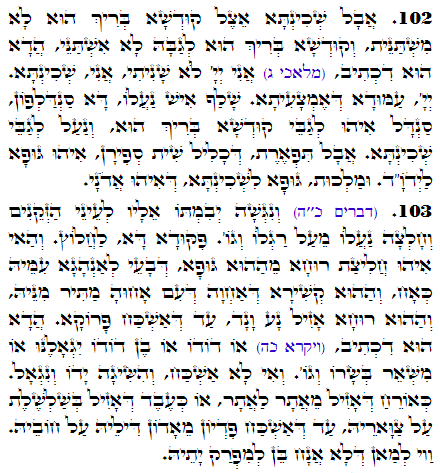Daily Zohar # 2821 – Ki Tetze – She pulls his sandal and spit
Daily Zohar 2821
Daily Zohar 2821

.
Hebrew translation:
103. וְנִגְּשָׁה יְבִמְתּוֹ אֵלָיו לְעֵינֵי הַזְּקֵנִים וְחָלְצָה נַעֲלוֹ מֵעַל רַגְלוֹ וְגוֹ’. מִצְוָה זוֹ לַחֲלֹץ, וְזוֹהִי חֲלִיצַת רוּחַ מֵאוֹתוֹ גּוּף, שֶׁצָּרִיךְ לִנְהֹג עִמּוֹ כְּאָח, וְאוֹתוֹ קֶשֶׁר הָאַחֲוָה שֶׁעִם אָחִיו מַתִּיר מִמֶּנּוּ, וְאוֹתָהּ רוּחַ הוֹלֶכֶת נָע וָנָד עַד שֶׁמּוֹצֵאת גּוֹאֵל. זֶהוּ שֶׁכָּתוּב (ויקרא כה) אוֹ דֹדוֹ אוֹ בֶן דֹּדוֹ יִגְאָלֶנּוּ אוֹ מִשְּׁאֵר בְּשָׂרוֹ וְגוֹ’. וְאִם לֹא מָצָא – וְהִשִּׂיגָה יָדוֹ וְנִגְאָל. כְּאוֹרֵחַ שֶׁהוֹלֵךְ מִמָּקוֹם לְמָקוֹם, אוֹ כְּעֶבֶד שֶׁהוֹלֵךְ בְּשַׁלְשֶׁלֶת עַל צַוָּארוֹ עַד שֶׁמּוֹצֵא פִדְיוֹן מֵאֲדוֹנוֹ עַל חֶטְאוֹ. אוֹי לְמִי שֶׁלֹּא הִנִּיחַ בֵּן לִגְאֹל אוֹתוֹ.
.
Zohar Ki Tetze
#102
There is no change in the relation of the Shecinah and the Holy One Blessed be He. ‘I’’אני’ in the verse (Malachi 3:6) “For I, YHVH, do not change”, is Malchut, which is the vessel, ‘אדני’ ADNY, for the Shechina. The Central column with the six Sefirot of Zeir Anpin is the vessel/body for YHVH.
#103
Deuteronomy 25:9
“וְנִגְּשָׁה יְבִמְתּוֹ אֵלָיו לְעֵינֵי הַזְּקֵנִים וְחָלְצָה נַעֲלוֹ מֵעַל רַגְלוֹ וְיָרְקָה בְּפָנָיו וְעָנְתָה וְאָמְרָה כָּכָה יֵעָשֶׂה לָאִישׁ אֲשֶׁר לֹא יִבְנֶה אֶת בֵּית אָחִיו”
“then his brother’s wife shall come to him in the sight of the elders, and pull his sandal off his foot and spit in his face; and she shall declare, ‘Thus it is done to the man who does not build up his brother’s house.’”
The soul of the dead brother comes to the living brother, awaiting him to Levirate the marriage to his wife. The soul is not rested until the living brother couple with the wife or ask her to release him. The process is described in the verse above. The woman spitting in front of the brother is the aspect of shaming the brother for not fulfilling the precept of continuation for the soul of his brother.
When the woman takes off the man’s sandal that represents the connection to Malchut, the soul of her dead husband is released from the brother. The soul continues to wonder until its redemption by another borher, relative or reincarnation.
{||}

 Previous: Ki Tetze
Previous: Ki Tetze
